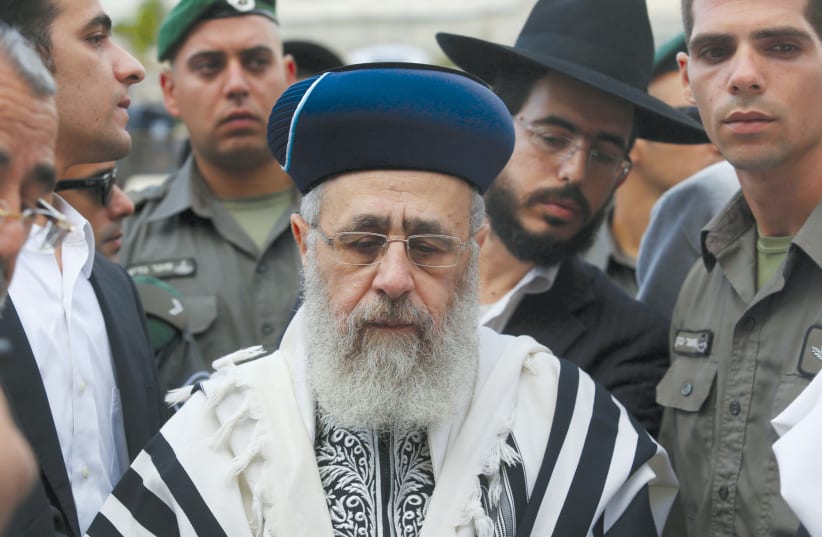My task as a journalist is to bring to the fore matters that Israelis care about, so today I am discussing the vexing conundrum of the standards of kashrut (keeping kosher) as well as its intra-religious rivalry.
In Judaism, it is not only morals that we value, but ethics as well play an important role in our lives. Our Torah, the five books of Moses, besides our ancient history also contains our laws by which we are to live. It is accepted that not even one syllable in this holy document is superfluous and without specific meaning. Yet the ethical command: “Lo zevashel g’di b’chalev imo” – Do not boil the kid in the milk of its mother – is repeated three times in different parts of this holy scroll.
Our sages explain that the second time means we shall not eat it, and the third, that we shall not have any use of it, which means not to gain advantage or reward from combining it.
So how should we understand this important command, stated three times without further explanation, when we no longer have goats living outside our tent and the culture of eating has completely changed, yet we know that the Torah is relevant for all times?
This is when we once again turn to our sages, whose wisdom was beyond ours, and who help us to understand what seems to us to be illogical in modern times particularly because the prohibition and the context are unclear.
It is argued that the Torah simply quotes the kid as an example, so the sages have extended the prohibition to all kosher domestic animals, (those who chew the cud and have cloven hooves), and even if we buy milk and meat in different markets and it is unlikely to be from the same animal, the prohibition still stands.
Among many other interpretations, Rabbi Samson Raphael Hirsch explains that meat represents the animal portion of life, the muscle and sinew and milk represents the reproductive capacity of animal life and the nourishment that supports new life. Animals instinctively eat and reproduce, but man has a higher calling – he must learn to differentiate between his activities. This is symbolized by the prohibition against mixing milk and meat.
Consequently, our rabbinical heads in modern times have established a system by which premises for food production and premises of food consumption are supervised by religiously qualified persons, and the establishments are being certified as producing or selling dairy or meat products. A larges number of Jewish communities in the world accept their Chief Rabbinate’s certificate.
But now we get to a conundrum. There are some, particularly haredi Orthodox, for whom that is not safe enough, and they want a certification by their own rabbi or rebbe to ensure strict adherence. As a result, many products already certified by the Chief Rabbinate also carry the stamp of one or another rebbe from a haredi group.
The story does not end here. You would think that certification by a haredi rabbi would now be accepted by every stream of haredim. Wrong! Many still don’t eat in each other’s homes because the food is not stamped by the rebbe of their particular sect.
It’s a sad story, that one Torah observant Jew does not accept the kosher observance of his neighbor, because he follows the teachings of a different rebbe.
As to the kosher observances of haredim, there is no doubt. But it is deplorable that they engage in a system of one-upmanship even among themselves: “The way my rebbe interprets the law is more accurate than yours.”
There are at least six haredi rabbinical symbols, some of which are accepted by some haredi groups – or sects, if you prefer that term – while others only trust different symbols carrying the name of other rabbis.
The apparent underlying reason for the mistrust is the possibility of fraud or lax supervision.
Unfortunately, neither the Chief Rabbinate nor the government help to allay the mistrust. Quite to the contrary, their actions aggravate the situation. Religious Affairs Minister Matan Kahana intends to introduce reforms of kosher supervision, and has invited Sephardi Chief Rabbi Yitzhak Yosef for consultations. He is a dayan, a judge, who is an expert on Jewish law and criticized Kahana’s proposed reforms and did not agree to a meeting.
Enter the ombudsman of the Israeli judiciary, and former Supreme Court justice, Uri Shoham, who thought it was his duty to request that Kahana summon and reprimand the chief rabbi and even ask for his dismissal.
The ombudsman seems to be unaware that according to paragraph 19 of the Chief Rabbinate of Israel law 1980, the only reason a Religious Affairs minister can prevent a chief rabbi from carrying out his duties is if he is declared permanently unfit for health reasons, and that, only on the strength of the opinion of three physicians. The chief rabbis, both Ashkenazi and Sephardi, are appointed for a term of 10 years
Instead of reasoned argument, we hear statements that are offensive to the office of the Chief Rabbi, just to promote the Left’s political agenda. This really amounts to politicizing the laws of Torah.
Our scriptures teach us how to disagree without being disagreeable. They remind us that we don’t have to say out loud everything we think. Sometimes, out of respect for another person, it may be more appropriate to remain silent. But they also suggest that even while respecting others, we can still turn away from opinions we don’t accept. We can both show respect and at the same time discreetly and politely remain true to our own beliefs.
Having said all that, which is sad enough, the government has recently withdrawn the monopoly from the Chief Rabbinate to supervise kosher certification and sanctioned the new organization Zohar to compete. They allow the food establishment to declare their strict adherence to the laws of kashrut without, as I understand it, the presence of a qualified supervisor. Surely, when observing any laws of the Torah and particularly the laws of kashrut, one should not have to compete for accuracy. We don’t compete for accuracy in the secular laws of the land.
In their home, individuals either keep to the rules or they do not. There cannot be any official supervision. Of course, a manufacturer or dispenser of food has a further responsibility to the public who buy their products. Therefore, in addition to their personal assurances, a method of official rabbinical supervision is essential. The strict adherence to the laws by establishments displaying the sign of Zohar, which relies on the word of the proprietor, however honest, is not being accepted as totally reliable by the strictly Orthodox.
Eggs containing a blood spot are not kosher. Therefore, all eggs have to be examined in a glass before use. Will the kitchen hand diligently perform this task, or should that be performed by the rabbinical supervisor?
MK Michael Malkieli, of the Shas Party, referred to the decision of the ombudsman to summon the chief rabbi to a hearing as a “national day of mourning” that will be remembered for generations.
In his response to the ombudsman’s decision, United Torah Judaism leader MK Moshe Gafni said:
“Judge Shoham cannot continue in his position after harming the chief rabbi of Israel and trying to prevent him from carrying out his role as prescribed in Jewish law. I support the chief rabbi of Israel, who does his job faithfully and protects millions of Jews in Israel and around the world in maintaining kosher standards and other matters of Jewish law.”
Those words underline that the purpose of the Chief Rabbinate is to protect the Jewish nature of Israel, the Torah, and even Diaspora Jewry.
On the other hand, in politics, timing can make the difference between winning an argument and losing it. That is the art of diplomacy, which it seems is sadly missing from the repertoire of Moshe Gafni.
At a time when we need to persuade Avigdor Liberman to adopt a more reasonable approach to the lifestyle and demands of the haredim and other Torah observant Jews, Gafni acts like a bull in a china shop with his efforts to prevent local authorities from running Shabbat public transportation services.
Of course, one must expect nothing less from UTJ than their objection to the desecration of the Shabbat and quite rightly so. But having no regard for the composition of the present government, when the right-wing needs every vote they can get, it is a faux pas of large proportions to raise a subject that will be interpreted as religious coercion when he said: “We will make a law so that mayors and municipal authorities will not be able to do what they want”.
Religious Affairs Minister Matan Kahana responded to the no-confidence motion submitted against him in the Knesset by the haredi parties objecting to any reform. In a passionate speech, edited here, he criticized members of the Shas and UTJ parties, who repeatedly interrupted his remarks when he said:
“The truth has been revealed. I understood who you are fighting against – not against the Reform [movement], and not against me. You are fighting against my rabbis and against the study halls where I and my friends grew up, against important rosh yeshivot and against municipal rabbis in Israel, who do not do what you want and therefore you dare to call them ‘Reform.’ For you, there are either reformers or haredim. You are fighting against the right of Religious Zionism to self-determination. You want religious Zionism small and submissive. Our rabbis and our public is Reform to you. Knesset member Deri does not believe that it is possible to be Orthodox and not haredi. Stop patronizing Religious Zionism. We observe the commandments no less than you. The Torah is dear to us no less than to you. During my term of office, religious Zionism will no longer be meek and submissive under your feet.”
Kahana also turned to members of the Religious Zionist Party and asked: “Why are you cooperating with this? The haredi MKs want to erase entire study halls of religious Zionism. Why do you insist on being Deri and Gafni’s errand boys? When they organized a war conference ‘for the salvation of Judaism,’ who didn’t they invite? The people with knitted kippot. Why didn’t they invite you? Because they do not count you. For them you are not religious enough.”
The minister concluded: “MKs (Arye) Deri and (Moshe) Gafni, hear this well: the days of stepping on us are over. The days of telling us who deserves to be a judge or a rabbi and who is disqualified are over. We are no less strict about the law and we are no less God-fearing, and we are not going anywhere.”
It is commendable that Kahana is resisting the efforts of the extremist elements to further curtail the Religious Zionism constituent of the Jewish state. But on Kahana’s proposed conversion reform that would allow local rabbis to perform that important and holy task, Chief Rabbi David Lau commented: ”It involves a great deception, and it will cause the destruction and rupture of the Jewish people and will also affect Diaspora Jewry.”
Is it not time that we abandon these differences among Jews and expand the definition of “we” and shrink the definition of “they?”
On the observance of our kashrut laws there should never be a compromise, but whether its oversight should be the exclusive domain of the Chief Rabbinate or also of other supervisory organizations is a matter of ongoing debate. ■
Walter Bingham, who turned 98 on January 5, holds the Guinness World Record as the world’s oldest active journalist and radio talk show host. He presents Walter’s World on Israel National Radio (Arutz7) and The Walter Bingham File on Israel Newstalk Radio, both of which are in English.

